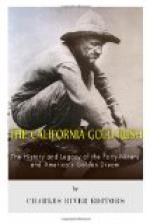By 1840 the foreign population had by these rather desultory methods been increased to a few over four hundred souls. The majority could not be described as welcome guests. They had rarely come into the country with the deliberate intention of settling but rather as a traveler’s chance. In November, 1841, however, two parties of quite a different character arrived. They were the first true immigrants into California, and their advent is significant as marking the beginning of the end of the old order. One of these parties entered by the Salt Lake Trail, and was the forerunner of the many pioneers over that great central route. The other came by Santa Fe, over the trail that had by now become so well marked that they hardly suffered even inconvenience on their journey. The first party arrived at Monte Diablo in the north, the other at San Gabriel Mission in the south. Many brought their families with them, and they came with the evident intention of settling in California.
The arrival of these two parties presented to the Mexican Government a problem that required immediate solution. Already in anticipation of such an event it had been provided that nobody who had not obtained a legal passport should be permitted to remain in the country; and that even old settlers, unless naturalized, should be required to depart unless they procured official permission to remain. Naturally none of the new arrivals had received notice of this law, and they were in consequence unprovided with the proper passports. Legally they should have been forced at once to turn about and return by the way they came. Actually it would have been inhuman, if not impossible, to have forced them at that season of the year to attempt the mountains. General Vallejo, always broad-minded in his policies, used discretion in the matter and provided those in his district with temporary permits to remain. He required only a bond signed by other Americans who had been longer in the country.
Alvarado and Vallejo at once notified the Mexican Government of the arrival of these strangers, and both expressed fear that other and larger parties would follow. These fears were very soon realized. Succeeding expeditions settled in the State with the evident intention of remaining. No serious effort was made by the California authorities to keep them out. From time to time, to be sure, formal objection was raised and regulations were passed. However, as a matter of plain practicability, it was manifestly impossible to prevent parties from starting across the plains, or to inform the people living in the Eastern States of the regulations adopted by California. It must be remembered that communication at that time was extraordinarily slow and broken. It would have been cruel and unwarranted to drive away those who had already arrived. And even were such a course to be contemplated, a garrison would have been necessary at every mountain pass on the East and North,




